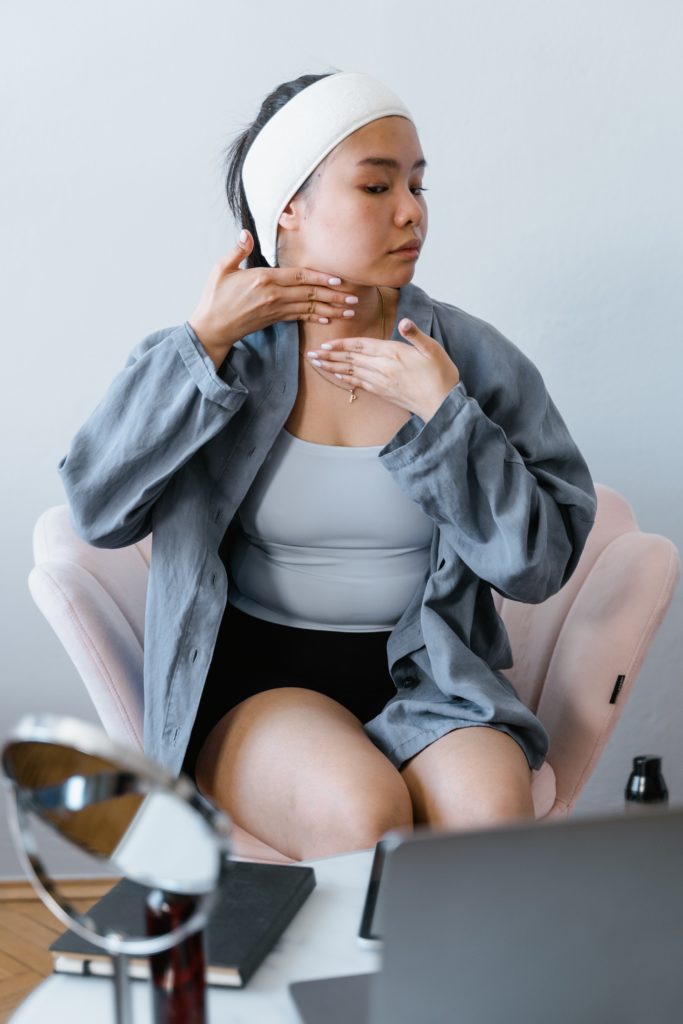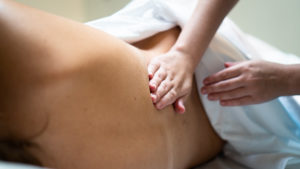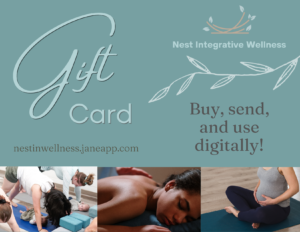Written by Mackenzie Poirier (RMT) for Nest Integrative Wellness
In honour of Maternal Mental Health Week, let’s jump into the world of self-care massage and discuss how it can serve as a tool to help alleviate symptoms of anxiety and depression during the perinatal period.
Massage therapy is most commonly known for its ability to promote relaxation, reduce stress, and ease muscle tension. However, for many individuals scheduling regular appointments may not always be feasible. This is where the practice of self-care massage steps in, offering clients the opportunity to take their well-being into their own hands, quite literally.
Everybody’s body is different, and where you hold stress may be different from the next person. Let’s go over three simple yet effective techniques that can be incorporated into your self-care routine, targeting some of the most common ‘problem areas’.
Each section will go into more detail about each option that Mackenzie recommends, and you can also follow along on the Instagram reel we’ve got where she demonstrates each one!


Pregnancy and postpartum can place significant strain on the hamstrings and piriformis, leading to discomfort and stiffness. Foam rolling is a self-myofascial release technique that can help alleviate tightness in this area. By gently rolling back and forth on a foam roller placed under the thighs, you can help promote blood flow, reduce muscle tension, and enhance flexibility in the hamstrings and piriformis.
If you feel as though this is a piece of cake, you can try transferring the foam roller to under the glutes. You may notice an increase in tenderness in this area.

The chest muscles, or pectoralis major and minor, often bear the brunt of carrying and nursing a baby. Tension in these muscles is often linked to poor posture and shoulder discomfort. To relieve tension in the pecs, try using your fingertips, knuckles or a massage ball to apply gentle pressure and knead the muscles along the sternum (breastbone) and outer chest. Incorporating deep breathing exercises during pec self-massage can further enhance relaxation and release tension.

The upper trapezius muscles, located at the base of the neck and extending to the shoulders, are notorious for harboring trigger points— a hyper irritable band within the muscle, often referred to as a ‘knot’. A mushroom stone, a curved stone with a smooth surface, can be used to apply targeted pressure to trigger points in the upper traps. Begin by applying gentle pressure and gradually increase as tolerated, focusing on areas of tightness and discomfort. You may choose to hold the stone statically, or glide it around the muscle. Ensure that you are not experiencing pain, holding your breath or tensing your body.
While these self-care massage techniques can provide valuable relief, it’s important to listen to your body’s cues and modify as needed. If you experience any pain or discomfort with any technique, discontinue the massage and consult with a healthcare professional.
Self-care massage is a powerful tool for promoting maternal mental health during the perinatal period. By performing the techniques provided, you can cultivate a sense of well-being and help alleviate symptoms of anxiety and depression. Remember, taking time for self-care isn’t selfish, it’s essential for nurturing both your physical and mental health as you navigate motherhood.

Our Registered Massage Therapist Mackenzie is trained and highly experienced in supporting prenatal and postnatal needs. She also treats infants, children, teens, and older adults with appointment times ranging 30 minutes to 2 hours. Customize your massage further by opting for the pregnancy bolster (even if you aren’t pregnant), choice of music, table warmer, and more!
How can she support your well-being today?

Give the gift of wellness, relaxation and self-care! Treat someone special to a gift card – the perfect present for a healthier, happier life.